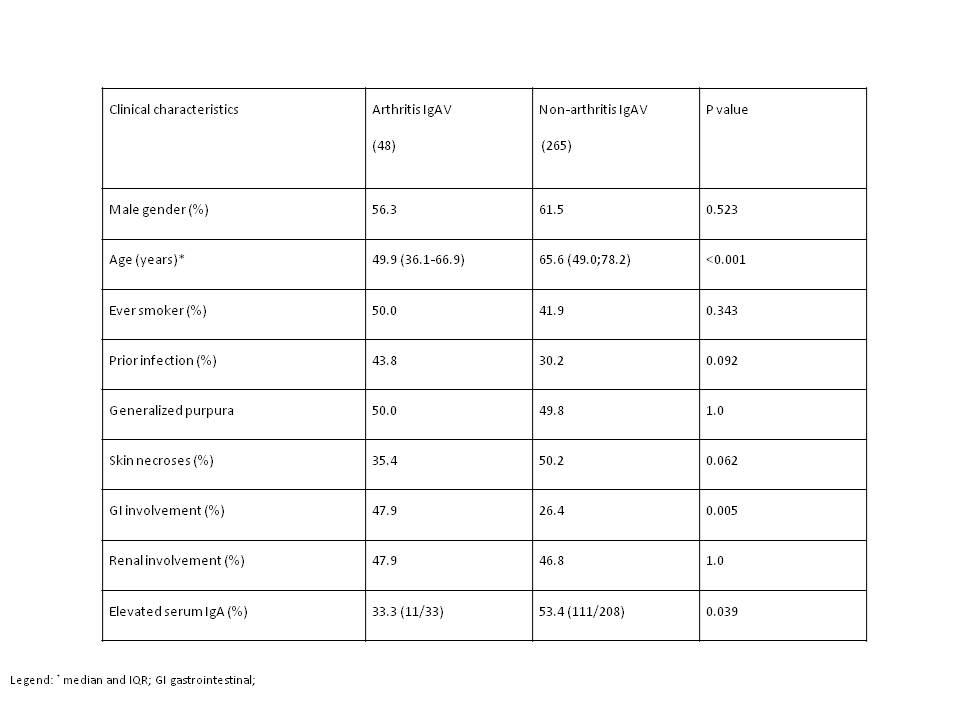Session Information
Session Type: Poster Session A
Session Time: 9:00AM-11:00AM
Background/Purpose: Arthritis is one of the main clinical features in IgA vasculitis (IgAV). In children, joint involvement represents the second most common manifestation with the prevalence of ≈75%, and predilection for the knees and ankles. The aim of our study was to describe the characteristics of arthritis in adult IgAV.
Methods: We analysed medical records of histologically proven adult IgAV cases, diagnosed between January 2010 and May 2020 at our secondary/tertiary rheumatology centre. The frequency, temporal occurrence and the localization of arthritis was recorded. Additionally, we explored potential differences in other clinical features of acute IgAV between patients with and without arthritis.
Results: During the 125-month observation period we identified 313 new IgAV cases (60.7 % males, median (IQR) age 64.6 (45.6; 77.1) years). Arthritis developed in 48 (15.3%) patients and was the first IgAV manifestation in 16 (5.1%) patients. Arthritis was mono-, oligo- and poly- articular (involving up to 15 joints) in 13 (4.2%), 25 (8%) and 10 (3.2%) patients, respectively. Arthritis was most common in wrists and ankles (each in 18 (37.5%) patients); metacarpophalangeal joints and knees (each in 11 (22.9%)); proximal interphalangeal joints (9 (18.8%)); elbows (8 (16.7%)) and metatarsophalangeal joints (4 (8.3%)). Table 1 shows clinical differences between IgAV patients with and without arthritis. Patients with arthritis were significantly younger, more commonly had gastrointestinal tract involvement and less frequently elevated serum IgA. Arthritis remitted in all with immunomodulatory treatment (given predominantly for necrotic skin purpura or visceral involvement). Follow up (FU) data accessible for 40/48 (83.3%) patients with arthritis showed that IgAV relapsed in 10 (25%) patients during a median (IQR) 24.6 (11.2; 41.8) month FU. Relapses were limited to skin and/or kidneys, there were no relapses of arthritis.
Conclusion: Arthritis more commonly affected younger adults with IgAV, was frequently oligoarticular, involved large and small joints of both upper and lower extremities and unlike skin lesions or renal involvement was not prone to chronic course and recurrence.
 Table 1. Clinical characteristics of IgA vasculitis patients with and without arthritis
Table 1. Clinical characteristics of IgA vasculitis patients with and without arthritis
To cite this abstract in AMA style:
Hocevar A, Jurcic V, Tomsic M, Rotar Z. Characteristics of Arthritis in Adult IgA Vasculitis [abstract]. Arthritis Rheumatol. 2020; 72 (suppl 10). https://acrabstracts.org/abstract/characteristics-of-arthritis-in-adult-iga-vasculitis/. Accessed .« Back to ACR Convergence 2020
ACR Meeting Abstracts - https://acrabstracts.org/abstract/characteristics-of-arthritis-in-adult-iga-vasculitis/
